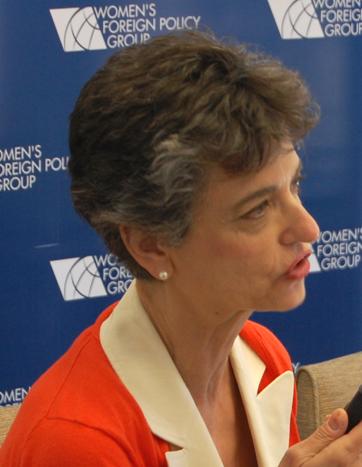Iran: What Can We Expect from a Rouhani Presidency?
Barbara Slavin, the Atlantic Council
Photos | Transcript

Washington, DC—On July 18, 2013, Barbara Slavin, Senior Fellow at the Atlantic Council’s South Asia Center, joined WFPG for a discussion on “Iran: What Can We Expect from a Rouhani Presidency?” Slavin briefed attendees on the results of the country’s recent presidential elections and explored their implications for the nuclear issue and for Iran’s relationships with the US and with other countries in the Middle East. She also discussed how Iran’s political posture could change in response to the rapidly evolving regional landscape. In the discussion, moderated by WFPG President Patricia Ellis, Slavin outlined several reasons for “cautious optimism” with regard to Iran’s pragmatic new president, a well-connected former nuclear negotiator who may be able to work across “paralyzing” factional divides to address the economic crisis Iran currently faces.
Slavin acknowledged the troubled history of US–Iranian relations, but emphasized that one-on-one talks between the two countries’ negotiators may provide a better opportunity for engagement than might be possible through the unwieldy P5+1 process currently being facilitated by the UN. Hassan Rouhani, Iran’s newly elected president, is a longtime member of the national security establishment, said to have the trust and confidence of Ayatollah Ali Khamenei; Slavin expects that, following his commanding first-round victory on June 14th, Rouhani may be given a certain amount of space to negotiate and to pursue the outward-looking policies needed to address Iran’s economic problems.
Slavin also believes the West “may be at the peak of our leverage” in negotiations with Iran. With the unpopular Mahmoud Ahmadinejad out of the picture, it is likely that Rouhani will try to take the opportunity to reposition his country as a reasonable and cooperative interlocutor on the global stage. He understands the close connection between sanctions abroad and economic instability at home. Due in part to strict limits on Iran’s oil exports and international financial transactions, the value of the currency has plunged, and job creation cannot keep pace with the numbers of students graduating from universities every year. Rouhani, while insisting on Iran’s right to continue enriching uranium, has also emphasized, according to Slavin, that “wheels need to spin in factories. It’s not enough just to have centrifuges running.”
Slavin also suggested that changing regional security dynamics could contribute to a rethinking of Iran’s policy on Syria. Rouhani has indicated that he will seek to dial down tensions with Saudi Arabia, and the Iranian regime remains concerned with the stability of Iraq’s Shiite government. As the Syrian conflict worsens, and as its sectarian quality grows increasingly pronounced, Iran may find that its interests are best served by efforts to join other regional stakeholders in shaping a settlement for Syria. Iran may also seek to adjust its regional posture in response to recent developments in Egypt and Turkey, where popular mobilizations have challenged Islamist regimes from across the political spectrum.
Slavin further highlighted recent remarks suggesting that Rouhani may soften some of the regime’s most repressive domestic policies. Given his closeness to the Ayatollah, however, he is unlikely to take radical steps. Although Slavin emphasized that “the change that will come in Iran will come in an evolutionary manner,” she believes that Rouhani’s election presents an opportunity for engagement—an opportunity that the West must take seriously if it hopes to make progress.